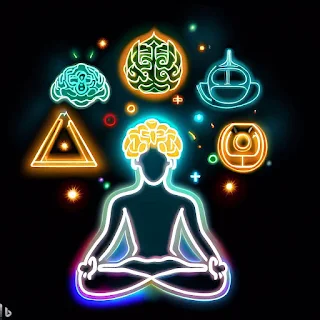Meditation is a practice that has been around for thousands of years, but it is still not fully understood by science. Some claim that meditation can help you achieve a state of consciousness that connects you with the universe beyond the everyday. Is there any truth to this claim or just a conspiracy theory?
In this article, we explore the evidence behind the idea of meditation as a gateway to the universe and the potential impact of this phenomenon on society. We'll also look at some of the challenges and risks involved in pursuing this path.
The case of Rinpoche: Tibetan monk with extraordinary brain waves
One of the most interesting examples of meditation and its effects on the brain is the case of Rinpoche, a Tibetan Buddhist monk who received extensive training in a form of meditation called "mindfulness." Rinpoche participated in a study conducted by researchers at the University of Wisconsin-Madison, who used electroencephalography (EEG) and functional magnetic resonance imaging (fMRI) to measure Rinpoche's brain activity.
The results were amazing. Rinpoche's brain exhibited abnormal levels of gamma waves, which are associated with consciousness, attention, learning, and memory. His gamma waves are not only large in amplitude, but also synchronized across different regions of the brain, indicating a high degree of integration and coherence. Furthermore, his gamma waves persist even when he is not meditating, suggesting that he has reached a permanent state of heightened consciousness.
Researchers concluded that Rinpoche's brain was "off the rails" and that he was "the happiest person in the world." They also speculated that his brain might have access to information and insights normally inaccessible to ordinary people.
Can anyone reach this state of consciousness?
Rinpoche's case is exceptional, but not unique. Other studies have shown that meditation can cause changes in brain structure and function, including increased gray matter density, strengthened neural connections, improved cognitive performance, and reduced stress and anxiety. These effects were more pronounced in long-term meditators than in novices, suggesting that meditation is a skill that can be learned and improved over time.
However, not everyone can achieve the same level of mastery as Rinpoche. There are many factors that influence your ability to meditate effectively, including your personality, motivation, environment, instruction, and practice. Some people find it easier to enter deep states of concentration and relaxation than others, while others may struggle with distraction and doubt.
Additionally, pursuing this goal may involve some risks. Meditation can also trigger negative emotions such as fear, anger, sadness, and guilt. Some people may experience dissociation, depersonalization, or psychosis as a result of meditating too intensely or without proper supervision. Others develop an unhealthy attachment to the meditation experience or lose touch with reality.
Therefore, it is important to approach meditation with care and balance. It is not a silver bullet that can solve all your problems or make all your wishes come true. It is a tool that helps you develop a more mindful and compassionate way of living.
What impact does meditation have on society?
If meditation can indeed connect a person with the universe, what does this mean for society? How can this knowledge be used for good or evil?
One possible implication is that meditation could be used as a means to enhance human potential and well-being. By tapping into universal sources of wisdom and creativity, meditators may discover new solutions to global challenges such as poverty, war, disease, and climate change. You can also develop empathy and compassion for yourself and others, and build more harmonious relationships and communities.
Another possible implication is that meditation could be used as a weapon or tool of manipulation. By inducing altered states of consciousness in themselves and others, meditators can access sensitive information and influence people's thoughts and actions. They may also abuse their abilities for personal gain or power, or to harm those they oppose.
Although these scenarios are hypothetical and speculative, they illustrate the potential impact of meditation on society. Whether this effect is positive or negative depends on how individuals and groups practice and apply meditation.
in conclusion
Meditation is an interesting phenomenon that has been practiced for thousands of years by different cultures and traditions. Although it has been proven to have many benefits for the mind and body, there are also some drawbacks and risks. Some people claim that meditation allows you to connect with the universe, but others dismiss this idea as a conspiracy theory.
The truth may lie somewhere in between. While meditation may not literally connect you with the universe in a physical or metaphysical sense, it may help you access states of consciousness that reveal new perspectives and possibilities beyond the everyday. This state of consciousness may be rare and elusive, but it is attainable and potentially beneficial for those who seek it.
But this state of consciousness is not an end in itself. It is a means to an end, and that end is determined by each individual. Meditation can be used for good or bad, depending on one's intentions and actions. Therefore, it is important to practice meditation with wisdom and compassion, and to use it as a way to improve your life and the lives of others.








No comments:
Post a Comment